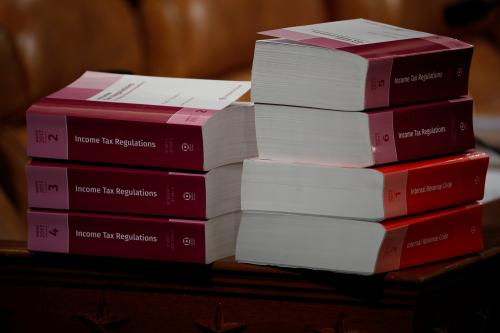This paper is part of the Spring 2019 edition of the Brookings Papers on Economic Activity, the leading conference series and journal in economics for timely, cutting-edge research about real-world policy issues. Research findings are presented in a clear and accessible style to maximize their impact on economic understanding and policymaking. The editors are Brookings Nonresident Senior Fellow and Northwestern University Professor of Economics Janice Eberly and Brookings Nonresident Senior Fellow and Harvard University Professor of Economics James Stock. Read summaries of all six papers from the journal here.
ABSTRACT
Climate change is driven by a build-up of greenhouse gases (GHGs) in the atmosphere, predominantly the result of the world’s consumption of fossil fuels. GHGs are a global pollution externality for which a global solution is required. I describe the role a domestic carbon tax could play in reducing U.S. emissions and compare and contrast to alternative approaches to reducing our GHG pollution. Carbon taxes have been implemented in twenty-seven jurisdictions around the world. I provide evidence on emission reductions and economic impacts of the British Columbia carbon tax, a broad-based carbon tax that has been in effect for over a decade now.
CITATION
Metcalf, Gilbert E. 2019. “On the Economics of a Carbon Tax for the United States.” Brookings Papers on Economic Activity, Spring, 405-484.
CONFLICT OF INTEREST DISCLOSURE
The author is a Professor of Economics at Tufts University and a Research Associate at the National Bureau of Economic Research. Beyond these affiliations, the author did not receive financial support from any firm or person for this paper or from any firm or person with a financial or political interest in this paper. He is currently not an officer, director, or board member of any organization with an interest in this paper. No outside party had the right to review this paper before circulation. The views expressed in this paper are those of the author, and do not necessarily reflect those of Tufts University or the National Bureau of Economic Research.
The Brookings Institution is committed to quality, independence, and impact.
We are supported by a diverse array of funders. In line with our values and policies, each Brookings publication represents the sole views of its author(s).







